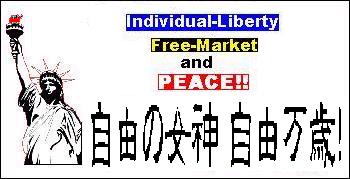a few brief reflections on a version of libertarianism

Libertarianism, of the political sort (there's another sort of libertarianism associated with free will v determinism arguments that I'm not concerned with here) has a high profile on the net, promoted with much sound and fury at times, and it has quite a few strands, some of which I’m sympathetic to, others not. In fact I've recently begun subscribing to an e-magazine, Reason.com, which I've just discovered is of the libertarian persuasion. It's not particularly strident, though, or noticeably ideological.
I'm in a little amateur philosophy group, and I led the discussion the other day on libertarianism. I introduced it via a philosophical paper by Jonathon Wolff, which was a critique of Nozick's famous Anarchy, State and Utopia. Not having read more than a few pages of Nozick's book (and that was near twenty years ago) I can't be sure that Wolff has represented it correctly, but it seems that Nozick, in arguing for the minimal state, relied heavily on rights - in particular, the negative right of an individual not to be interfered with or coerced.
Unfortunately Nozick provides little if any grounding for these claimed rights. Why do we have a right not to be interfered with or coerced? Where do such rights spring from? Rights are an invention, and quite a useful one in my view, but I also feel they need to be employed in a limited and careful way. To assert a particular right and then to use it as the basis for a political philosophy that, if followed, would turn our political situation into something radically different from what we currently experience, really does beg a particular question.
Another problem for Nozick's libertarianism, one barely mentioned by Wolff, is his treatment of the individual as the 'unit of liberty'. It's a political philosophy that valorises both liberty and the individual, as if to put both beyond criticism. At least on Wolff's account it's a highly rational argument that flows from the primacy of these two elements. Wolff also points out that Nozick is more a hyper-liberal than the free-market capitalist that so many libertarians turn out to be. This is where the utopian emerges, for Nozick imagines that his libertarianism minimal state doesn't necessarily entail capitalism, though it's of course compatible with it. In fact he envisages the formation of sub-states of freely associating like-minded people, elective affines if you will, pursuing their own interests without having to subsidise other groups. But this, Wolff argues, is economically naive. After all, Nozick's libertarianism is based on ownership, even self-ownership, which is the something that cannot or should not be interfered with. The individual must be free to give of oneself and also to accumulate for oneself, presumably by virtue of what is already owned. Ownership, free possession of goods, whether material or immaterial, is at the centre of this political philosophy, so capitalism seems pretty well unavoidable, and with the libertarian free flow of individuals between these like-minded sub-groups, you'll generally get the most successful and ambitious wanting to leave the most restrictive and financially unambitious (or unsuccessful, depending on how you look at them) groups. The gap between rich and poor groups would grow wider (many groups would become unviable and would dissolve) and you would be left, according to Wolff, with something like nineteenth century capitalism, with poorer groupings and individuals being forced to rely on the haphazard benevolence of the rich, in the absence of a welfare state or any kind of redistributive taxation system. A road to hell, or at least pointing that way, paved with Nozick's good intentions.
On the face of it, a devastating critique, but I'm sure libertarians can come up with better than this. In any case, I'm more interested, really, in where the balance should be struck between individual freedom and social protection as provided by the state. Looking at welfare, for example, I recognise the problem of welfare dependence - for corporations as well as for individuals - and the problems of systemic disadvantage and systemic exploitation that a non-welfare-based system and a non-redistributive system would encourage. There seems no alternative but to steer a course that provides both encouragement and protection, a course that requires constant shifting of the wheel to avoid the pitfalls on either side.


0 Comments:
Post a Comment
Subscribe to Post Comments [Atom]
<< Home